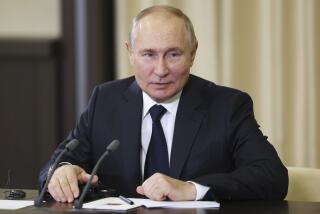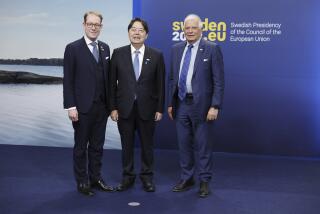Koizumi Tries to Reassure Chinese
- Share via
BEIJING — Japanese Prime Minister Junichiro Koizumi came to China on Monday to allay fears over his country’s military involvement in the war on terrorism and to assuage lasting Chinese anger over Tokyo’s military aggression during World War II.
Koizumi spent just six hours in the Chinese capital meeting with President Jiang Zemin and Premier Zhu Rongji, whose government has cautioned Tokyo to be “prudent” in giving any military backing to the U.S.-led strike on Afghanistan.
Although Japan is likely to offer only rear-guard technical and logistical support, Beijing remains deeply mistrustful of a neighbor it still casts as a former aggressor unwilling to own up fully to its shameful wartime past.
But the Communist regime here also is eager to appear constructive in the United States’ declared war on global terrorism. A Japanese government official, speaking on condition of anonymity, said Koizumi’s meetings with Jiang and Zhu were “very positive.”
“We can say the tense phase of the bilateral relationship has been improved by today’s meetings,” the official quoted Jiang as saying at the conclusion of the talks.
The discussions focused on both the history and the imminent future of Japanese military action.
To support the U.S.-driven effort to root out Osama bin Laden, the man accused of masterminding the Sept. 11 attacks on the World Trade Center and the Pentagon, Tokyo is set to pass a law allowing Japanese troops to engage in the closest they have come to combat in half a century.
The plan would dispatch Japanese warships to offer medical and transport assistance to U.S. and allied troops mounting the battle in Central Asia, as well as humanitarian aid to refugees.
Despite the plan’s limited scope, the Beijing regime remains leery of any expansion of Japan’s military role and of the long-standing security ties between Japan and the U.S., which it sees as coming at the expense of its own preeminence in Asia.
Jiang told Koizumi that Japan’s wish to help with the strike against terrorism is understandable but asked him to “please remember the wariness of Asian countries” about Japanese military action, the official said, adding that Koizumi reiterated the “very clear principle” that Japan not use force.
“This is because we learned from the past that Japanese military action victimized so many people,” he said.
Even so, the Chinese government has long accused Japan of showing too little remorse for its brutal occupation of China, which cost millions of Chinese lives. After Koizumi’s August visit to a shrine honoring Japan’s war dead, including officers from World War II, China’s leaders rebuffed his overtures for a meeting for weeks.
They relented with Monday’s quick-hit visit, Koizumi’s first as prime minister. The whirlwind tour began symbolically with a stop at the Marco Polo Bridge outside Beijing, where Japanese troops used a skirmish as an excuse for launching a full invasion in 1937. Koizumi is only the second Japanese prime minister to visit the bridge. Afterward, he repeated expressions of regret for the suffering his country inflicted on its giant neighbor.
Koizumi offered “his heartfelt apology and condolences” to those in China who fell victim to Japan’s aggression. But Koizumi’s statement stopped short of the written apology China has demanded.
More to Read
Sign up for Essential California
The most important California stories and recommendations in your inbox every morning.
You may occasionally receive promotional content from the Los Angeles Times.














